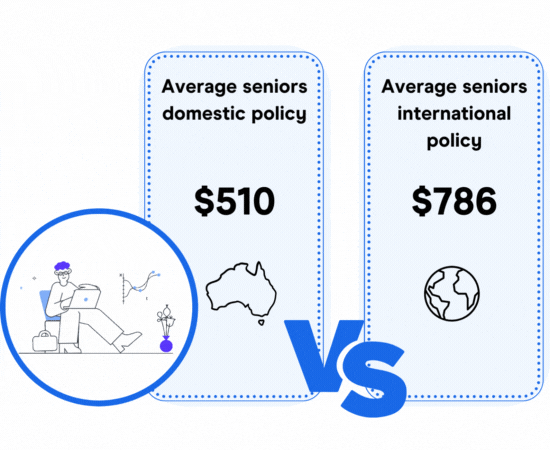Key takeaways
- Seniors can get travel insurance from pretty much any travel insurance provider.
- A couple of providers market specifically to seniors, including Boomers and Australian Seniors.
- No matter your age, it's generally worth comparing the full market.
Can seniors get travel insurance?
Yup, senior citizens can get travel insurance from most of the Australian travel insurance brands. There are maximum age limits, but they are mostly 99+ years. That means the large majority of seniors can get cover from any travel insurance provider.
Is senior travel insurance more expensive?
Travel insurance will be more expensive for seniors, because older Australians are considered riskier travellers. In particular, older folks are more likely to claim on their medical coverage when they travel overseas, This could be as a result of falling ill, getting accidentally hurt, or having a pre-existing condition flare up. Because of this, travel insurance providers charge a higher premium for older travellers.
Is senior-specific travel insurance worth it?
In Australia there are 2 companies that specifically market to seniors: Boomers and Australian Seniors. While there may be some part of their cover that appeal to you specifically because you're an older person, they are generally as competitive as any other provider.
In fact, providers that offer policies to young, lower risk travellers as well as seniors may actually end up cheaper. Insurers generally love low risk policies because they lower their overall risk profile. Some providers might use this as a way to reduce premiums for older travellers.
As with all financial products, smart money is on comparing products from as many providers as possible. Finder makes this easy, using the tools on this page!
Best travel insurance for seniors over 80
Unfortunately, we can't give you a specific policy that is the best travel insurance for over 80, because every policyholder is different. However, there are some best practices.
Getting the best travel insurance when over 80 years of age requires careful consideration of medical coverage and age-related exclusions. You'll want to focus on policies with more robust medical coverage, including emergency assistance and repatriation, as these are crucial for older travellers. Most countries you travel to will not have reciprocal health care agreements with Australia, so you need to be fully covered.
Look for insurers that are transparent about their age limits and pre-existing medical condition assessments. Be prepared to provide detailed medical information and consider policies with higher coverage limits to accommodate potential medical needs. You can generally use a provider's website to generate a quote that includes your medical declarations so that you can see the final price before you buy.
Speaking of price, make sure you compare quotes from multiple insurers - you can do this with Finder. Also, don't assume the best travel insurance for seniors over 80 is going to be a provider that markets specifically to seniors.
Who offers travel insurance to seniors?
| Brand | Age limit |
|---|---|
ahm | 99 and under |
 | 99 and under |
 | 125 and under |
| 89 and under | |
| 99 and under | |
| 100 and under | |
 Kogan | 125 and under |
 | 99 and under |
 | 118 and under |
| 99 and under | |
| 100 and under | |
| 90 and under | |
Wise and Silent | 99 and under |
 Travel Protect | 99 and under |
 | 85 and under |
| 130 and under | |
| 99 and under | |
| 99 and under | |
| 120 and under | |
| 120 and under | |
| 99 and under | |
 Worldcare | 120 and under |
Note: This information was last updated February 2026.
What should seniors travel insurance cover?
Medical expenses
Most comprehensive travel insurance policies cover you for unlimited medical expenses if you need to go to hospital. They also typically cover medical evacuations.
Delays and cancellations
29% of Australians, equivalent to around 5.8 million people, have had their flight delayed or cancelled in the last 12 months, according to Finder research. Travel insurance can cover you for cancelled or delayed flights.

COVID-19 expenses
Many travel insurance policies now cover COVID-related expenses. This includes if you need to cancel or rearrange your trip due to COVID.

Luggage and personal belongings
A good travel insurance policy should cover you for lost and delayed luggage, credit cards, traveller's cheques and personal items. This could be really helpful as according to Finder's latest 2023 research, almost 8% of Australians have lost personal items when travelling.
How do travel insurers cover pre-existing conditions?
Once you reach a certain age, you'll have had some things...well, break. Or not work right. Or just less good. Point is, you've got pre-existing conditions. The good news is you can probably still get travel insurance coverage.
Several travel insurers will cover you for certain pre-existing medical conditions like diabetes, hypertension and skin cancer at no extra cost.
However, if you have any pre-existing conditions, you must let your insurer know when you sign up. Declaring pre-existing conditions is super easy when you take out a policy, it takes a matter of minutes.
Once declared, your travel insurer may be able to offer you cover for your pre-existing medical condition. Sometimes this will be free, sometimes it will cost you extra. Alternatively, it may agree to cover you in general, but not for claims related to your pre-existing condition.
While it may be tempting to not declare pre-existing conditions, it's not worth the risk. If you don't tell your insurer, it could deny any future claim you may make!
How much does travel insurance cost for seniors?
How much does travel insurance cost is one of those 'how long is a piece of string' problems. The longer you're travelling, and the more risky the places you're travelling, the more you'll pay. That being said, we've done some some numbers to give you a bit of an idea.
We had a look at a single 79-year-old travelling for 2 weeks in Australia (domestic) and a few other destinations like New Zealand, Bali, Europe and the US (international).
We found the average cost of a seniors domestic policy was $510 and an international policy was steeper at $786. Use the comparison tools on this page to get a free quote for your next trip.

Senior travel insurance tips
- Book early: Your cancellation cover starts as soon as you take out a policy. This means if something goes wrong and you need to cancel or rearrange your trip, you'll be covered.
- Get COVID cover: "COVID still makes up 11% of all claims paid to customers," CEO of Southern Cross Travel Insurance, Jo McCauley, says. "On average we are paying out claims for cancellation and travel disruption due to COVID to the value of $1,500."
- Disclose any pre-existing medical conditions: You can do this when you apply for a policy. Travel insurers have made this process much simpler these days. In most cases, you just need to fill out a short questionnaire.
- Take documents with you: Keep a copy of your travel insurance policy as well as any medication you may take. This can make claiming simpler while you're overseas.
Frequently asked questions
Sources
Ask a question
65 Responses
Read more on Travel Insurance
-
Travel insurance for over 70s
Over 70 and need travel insurance? Compare your options to get affordable cover for what matters.
-
Travel insurance for over 85
Guide to finding travel insurance if you're over 85 years of age.
-
Travel insurance for over 75s
What you need to know about getting travel insurance when over 75 years of age.


Travel insurance for 82 yo
Hi Barry, you can take out travel insurance with any of the providers listed in the “Who offers travel insurance to seniors?” table on this page. Good luck!
Hi Im trying to get my policy no , so I can clam my insurance for cancelled trip
Thanks Roy
Hi Roy,
I’m sorry to learn that your trip was cancelled. I can understand how disappointing this must be.
You can find your insurance policy number by checking your policy document/contract. And if you have online access to your account, you can also go to your policy provider’s website and log in to your account to know your policy number.
I hope this helps,
Regards,
James
Hi S,
Thanks for getting in touch!
The one insured in the policy is the only person who is covered in the policy. The guardian/family member would need to have one and separate travel insurance.
You will find an online form on the page that will ask you to enter details of the trip. Enter all the information needed and click the ‘Get my quote’ button. This will lead you to another page that shows the insurers (according to your info) that may cover you.
You can find other filters on the left part of the page. You can compare the insurers by medical, cancellation, and excess cover, and price. To choose an insurer, simply click the ‘Go to site’ button to be redirected to their official website. Know that this is the stage to start your application.
As a friendly reminder, carefully review the Product Disclosure Statement of the product before applying. You may also contact the insurance provider should you have any questions about their policy.
Hope this helps and feel free to reach out to us again for further assistance.
Safe travels,
Nikki
Looking for the cheapest travel insurance to cover us for delay or cancellation or accident which may prevent us from completing the journey as per schedule. We are leaving from Gladstone and sailing out to Heron Island. Medical cover is not required as we are staying on Oz territory.
Hi Pete,
Thank you for getting in touch with Finder.
You’re currently at the right page. Kindly enter your details in the table like the date and destinations as well as the age of traveller/s then click on the get quote button to start comparing your options. Once the page has updated its info, at the left side of the page you may click on your needs under Required cover options and Specific cover types – for cruise cover. Once you have chosen the cheapest insurer, please click on the green go to site button or get quote button to be redirected to the insurer’s official page to learn more on their products or start your online application.
I hope this helps.
Thank you and have a wonderful day!
Cheers,
Jeni
I would like a quote please for travel insurance cover for two of us. We are both 61; my husband, Warren, is still working. He has a National Seniors card and I have a Victorian Seniors card. We are doing a fully escorted tour of NZ, which includes flights there and back, of course, coach, rail and cruise tours [lakes and rivers]. Our travel dates from Melbourne are Tuesday 17th September, returning to Melbourne on Tuesday 8th October, 2019.
Thanks from Belinda Smeal
Hi Belinda,
Thank you for reaching out to finder.
In getting a quote for travel insurance, we are on the right page. You just need to complete the details required via the form provided on this page and click on the green “Get my quote” button to see a panel of lenders that you could reach out to in taking out a travel insurance. Hope this helps!
Cheers,
Reggie